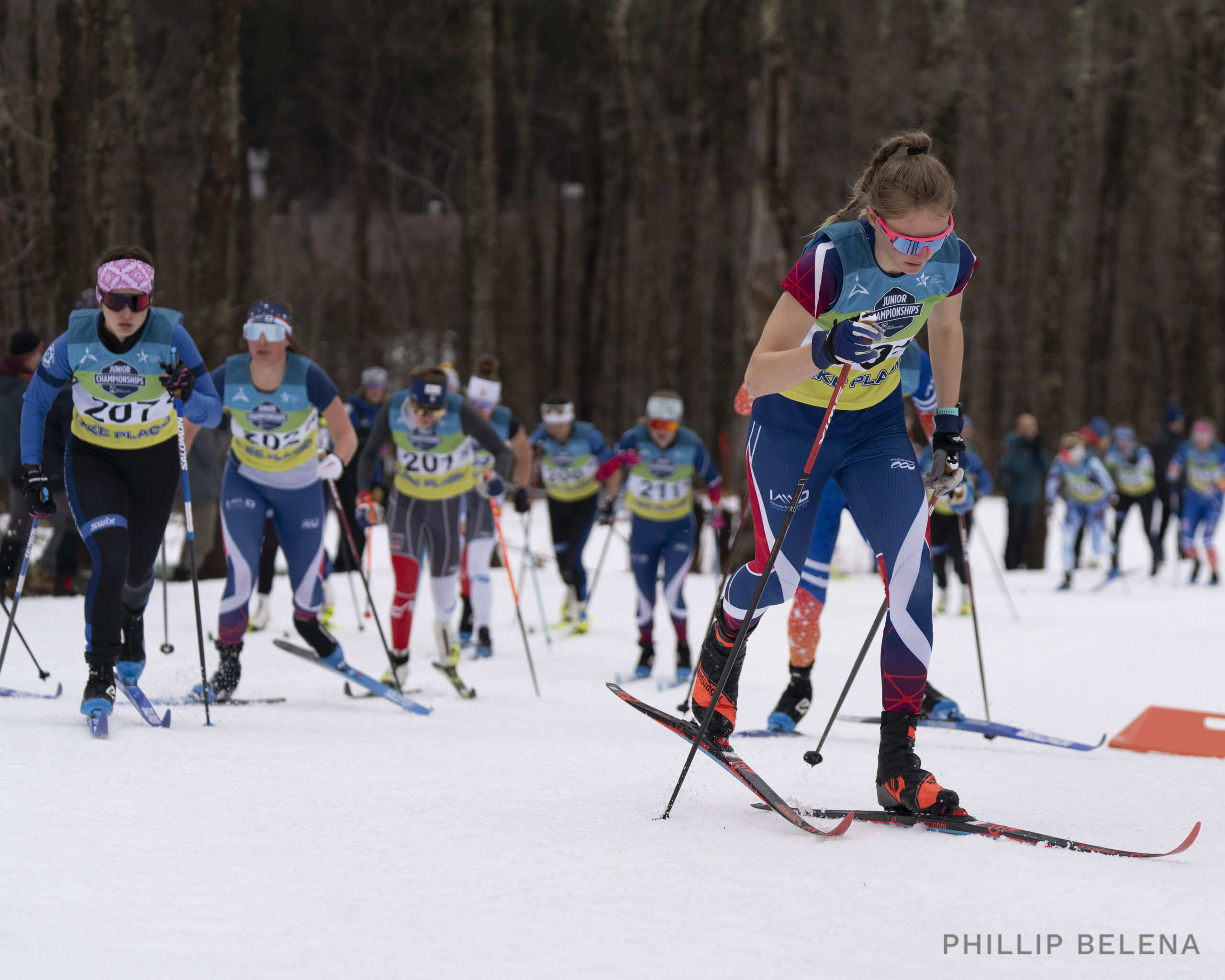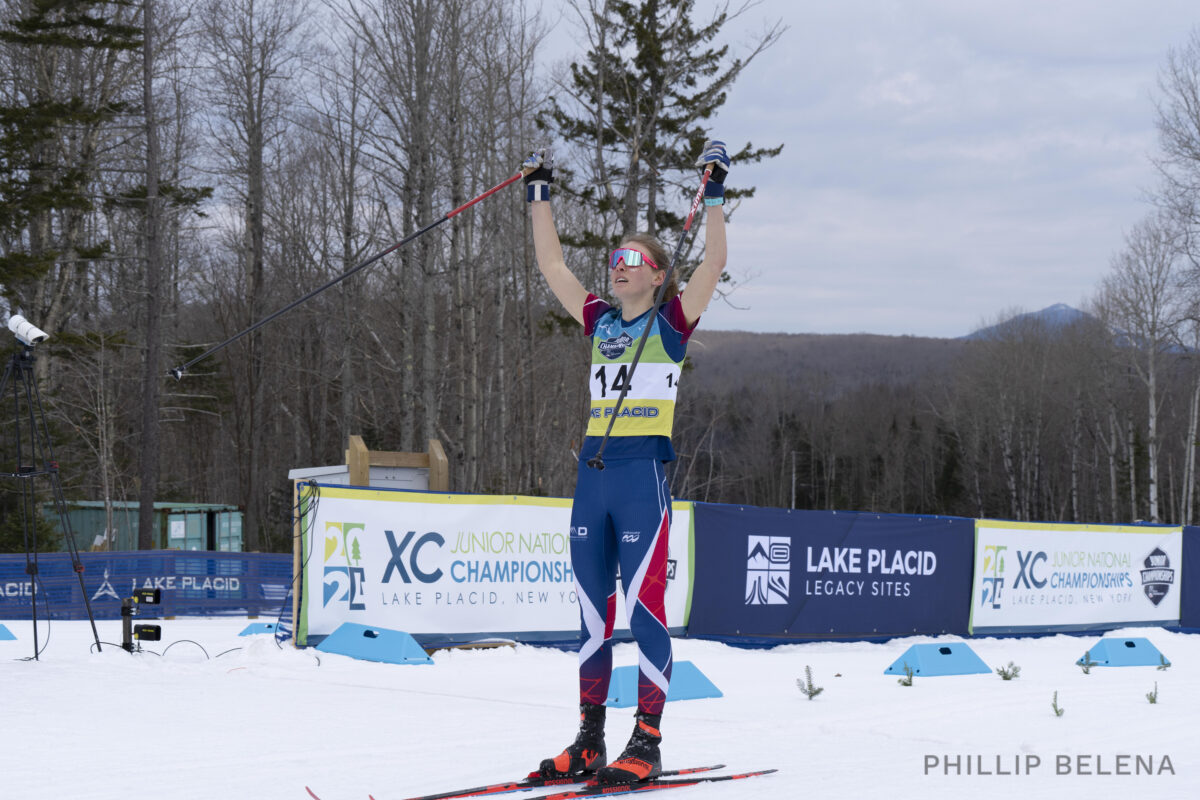Ingelfinger Nabs Two More National Skiing Titles
At the Junior National Championships, Whitefish senior Maeve Ingelfinger won the classic sprint and classic 10k cross country ski races
By Micah Drew
Hundreds of the nation’s fastest young cross country skiers descended on Lake Placid, New York, during the second week of March for the Junior National Cross Country Skiing Championships, the top competition for athletes under 20.
Racers were subject to “every weather pattern imaginable in a single week,” according to Glacier Nordic Club (GNC) executive director Jennie Bender, who made the trek out east with three GNC athletes.
“It was just a whirlwind of a week. It’s so fast paced already with so many races, and then you add crazy weather on top of that,” Bender said. “Wax techs had to be on top of it and athletes had to adapt to conditions that changed between races. All of our athletes did a great job managing the stress and we had strong performances across the board.”
Skiers raced in several inches of fresh powder during the first day of individual skate skiing races on March 11, followed by several rounds of classic sprint races two days later in rain and slush. Friday’s mass start classic distance races involved “the most wipeouts I’ve ever seen in a race,” Bender said, due to slushy conditions on the course’s corner. “I started staking out a corner with extra poles and skis for the racers that broke theirs.”
In the face of changing conditions and top-tier competition, GNC’s star performer and Whitefish senior Maeve Ingelfinger stayed calm and collected, delivering a series of podium-topping performances.
“My goal was to be in the top three for every individual event,” Ingelfinger said. “But I knew that the competition this year was going to be a little higher than last year, and the conditions were so strange, it didn’t help me tactically at the beginning of the week.”
Ingelfinger and her fellow GNC athletes Findley Dezzani and Liam Browne were all members of the Intermountain Division (IMD) team, comprising of members from Montana, Utah, Idaho and Wyoming. Athletes in the IMD spend more of their season at competitions in the region, which typically are held at high elevations with more difficult courses.
“On the first day I realized the course wasn’t breaking a lot of athletes like we see at the higher elevation races,” Ingelfinger said. “You could finish a race and not be totally gassed afterwards. I realized I had to just move fast the whole time, there’s no point in holding back to avoid redlining. That caught a lot of people off guard.”
After a seventh-place finish in the U18 individual skate event, Ingelfinger fell into a groove during the classic sprint rounds. Again and again she attacked the sprint course, sticking right with her competitors for most of each race and then gapping them right before the final hill climb. The strategy paid off as she easily advanced to the finals and, by then, “no one was able to stick with me on that last hill,” she recalled. “I was definitely tired and worried about falling and breaking a pole, so I just got out of the way of the other athletes and they couldn’t keep up.”
Following a national sprint title at junior nationals last March, as well as the junior classic and skate sprint titles at the U.S. Cross Country National Championships in January, last week’s result was right in line with Ingelfinger’s expectations.
“After my first title last year in Alaska, I started to really believe in my ability to win the sprint races. Training at elevation and being used to longer, harder courses has really helped my development,” she said.

It was in the 10k mass start classic race two days later that Ingelfinger really showed her prowess as a national caliber skier. She readily admits that sprints have long been her strength, and has spent much of the winter working on her ability to handle the longer races.
A three-hour delay preceded her chance to prove herself, however, as race officials worked on a last-minute course change due to the warming snow conditions.
“Having a long delay right before you’re expecting to race is one of the hardest things for an athlete,” Bender said. “It’s really a testament to Maeve’s maturity as an athlete that she can take that in stride, not let it phase her, and be ready to go as soon as the race starts.”
Ingelfinger’s race plan for the longer event was to stick with the lead group for much of the race, using her competitors as an effort gauge. However, on the first large climb, she was feeling “almost too good,” and broke away from the field.
“I just skied how I would have skied if it was an individual time trial race instead of a mass start,” she said. “I just started pushing myself.”
Her breakaway lasted into the second lap of the two-lap course before another racer caught and gapped her.
“I didn’t think I could catch her again,” she said, a sentiment shared by the commentators of the race’s live stream. “I was in a lot of pain at that point, but I also knew I was being closely tailed by another skier, so I just started running away from third place. In the process I just started slowly catching the leader.”
The final downhill corner of the race was a slushy, crash-inducing lefthand turn. The lead skier snowplowed through it, slowing down to safely navigate the hazards. Maeve, by contrast, “had nothing to lose, so I just sent it.”
“If it worked, I knew I’d win on the final hill climb. If it didn’t work, I’d get third,” she said. She powered through the final climb, double poled into the final stretch and won by two seconds, immediately collapsing past the finish line.
“I was super proud of myself for not giving up and sticking with it through the very end. My coach always says that ‘the race isn’t over until it’s over, and if you’re not first, there’s a tired person ahead of you to chase,” Ingelfinger said.
Also representing GNC well, Dezzani was making her second appearance at junior nationals and barely missed the podium with an 11th place finish in the individual start skate race. She finished 60th on the classic sprint day and 61st in the 10k classic mass start.
Browne, making his first trip to the national stage as a U16 athlete, finished 42nd in the individual skate race, 43rd in the classic mass start and 65th in the classic sprint qualifiers.
Going to junior nationals and getting to be around a like-minded community of dedicated skiers is huge for any athlete, especially those not aiming for a top result, Bender said. “All these athletes get to bring their experience and knowledge back to the club and that helps show the fuller picture of the Nordic skiing culture we’re trying to spread around Montana.”